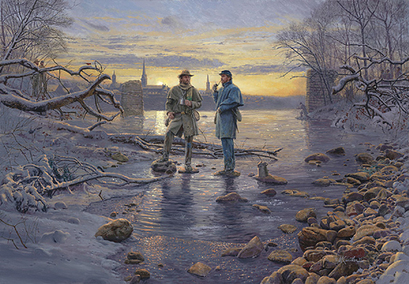By 1862 the Civil War had set in with all its grimness. The year saw a series of major battles that would long be remembered; the Seven Days Battles, Shiloh, Second Manassas, and Antietam, the bloodiest single day of the war. And while thousands had died in combat, and many more of disease, the conflict was not measurably closer to its conclusion.
Robert E. Lee, fresh from victory at Fredericksburg, wrote his wife, “What a cruel thing is war. To separate & destroy families & friends & mar the purest joy and happiness God has granted us in this world…. I pray that on this day when ‘peace & good will’ are preached to all mankind that better thoughts will fill the hearts of our enemies & turn them to peace.”
The Rappahannock was the front line of the war in the east, and the armies watched each other from camps nestled in snow. Rebel cavalry commander JEB Stuart crossed the river and rode around Union lines towards Dumfries, Virginia, circling towards Alexandria and Fairfax, netting hundreds of prisoners and 25 wagons. But for most of the soldiers on both sides Christmas was a time of reflection and making the best of their situation.
Tally Simpson of the 3rd South Carolina was ordered into Fredericksburg and saw the effects of the battle. “I have often read of sacked and pillaged towns in ancient history, but never, till I saw Fredericksburg, did I fully realize what one was. The houses, especially those on the river, are riddled with shell and ball. The stores have been broken open and deprived of every thing that was worth a shilling. … Several houses were destroyed by fire. Such a wreck and ruin I never wish to see again.” Union Brigadier General Marsena Rudolph Patrick, Provost Marshal of the Army of the Potomac, came across the river under flag of truce to meet with Confederate officers to discuss matters related to the late battle. The mood was light despite the setting. “Papers were exchanged, and several of our men bought pipes, gloves, &c from the privates who rowed the boat across,” Simpson noted. “They had plenty of liquor and laughed, drank, and conversed with our men as if they had been friends from boyhood.”
A half mile below the town the mood was considerably less jovial. Eighteen year old Private John R. Paxton, 140th Pennsylvania, was rousted from sleep for picket duty. “No breakfast; chilled to the marrow; snow a foot deep,” he wrote. He moved towards the river through the wind-whipped snow, “God’s worst weather, in God’s forlornest, bleakest spot of ground.”
As he paced along the riverbank he ruminated. “And so this is war…and I am out here to shoot that lean, lank, coughing, cadaverous looking butternut fellow over the river. … Pshaw, I wish I were home. Let me see. What are they doing at home? This is Christmas Day. Home? Well, stockings on the wall, candy, turkey, fun, merry Christmas and the face of the girl I left behind.” Struck by loneliness, or the absurdity of his situation, Paxton called out to the Rebel sentry on the other side of the river.
“Hello Johnny, what you coughing so for?”
“Yank, with no overcoat, shoes full of holes, nothing to eat but parched corn and tobacco, and with this darned Yankee snow a foot deep, there’s nothin’ left but to get up a cough by way of protestin’ against this infernal ill treatment,” the Rebel said. Others joined in. “Let’s laugh, boys.”
“Hello, Johnny.”
“Hello yourself, Yank.”
“Merry Christmas, Johnny.”
“Same to you, Yank.”
“Say Johnny, got anything to trade?”
“Parched corn and tobacco — the size of our Christmas, Yank.”
“All right; you shall have some of our coffee and sugar and pork. Boys, find the boats!” The Union pickets uncovered some miniature boats that had been secreted there for use by successive groups of sentries for just this illicit activity. They loaded them with cargo then set them adrift towards the opposite shore. The Rebels reached out to receive the shipment, brought the boats ashore and pulled out the contents.
“Hurrah for hog!” one exclaimed. “Say, that’s not roasted rye, but genuine coffee,” another commented. “Smell it, you’uns.” “And sugar too!” another said. “Reckon you’uns been good to we’uns this Christmas Day, Yanks.” The Rebels put what they could in the small boats for the return journey, parched corn, ripe persimmons, and some Virginia leaf, the latter of which was most welcome. For the rest of the morning the men chatted across the river, enjoyed their repast, and shared a smoke.
“And so the day passed,” Private Paxton wrote. “And we forgot the biting wind, the chilling cold; we forgot those men over there were our enemies, whom it might be our duty to shoot before evening. We had bridged the river, spanned the bloody chasm. We were brothers, not foes, waving salutations of good-will in the name of the Babe of Bethlehem, on Christmas Day in ‘62.”
(This story is an abbreviated version of James S. Robbins, "Bridging the River." http://www.rockit.news/2015/12/23/bridging-the-river-a-civil-war-christmas/)


 RSS Feed
RSS Feed